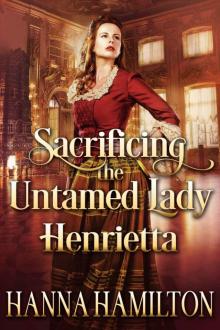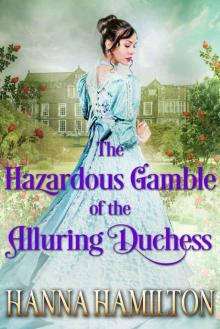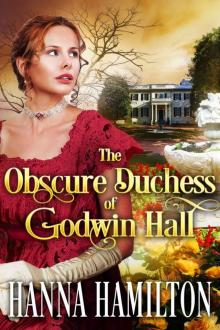- Home
- Hamilton, Hanna
The Hazardous Gamble of the Alluring Duchess: A Historical Regency Romance Novel Page 2
The Hazardous Gamble of the Alluring Duchess: A Historical Regency Romance Novel Read online
Page 2
With that, Roger’s manservant picked up the soiled clothing from the night before and retreated below stairs to commiserate with the butler and to let the cook know that the lord and master of the house was going to require a bit of cosseting.
Too tired, hungover and heartsick to argue with his friend and manservant, Roger flopped on the bed and buried his face in the pillow.
* * *
Sally, the head maid who had worked her way up from the scullery and remembered Roger as a little lad, took the clothing from Herbert and clucked her tongue over the state of the trousers. “He does not do anything by half, does he? I will have little trouble with the dogs’ paw prints, the grass stains and the mud, but that wine stain might not ever come out.”
“Do the best you can, Sally.” Herbert accepted the tray of biscuits and tea from the cook, and prepared to take them up to his friend and employer.
“Shouldn’t I send one of the girls up with that, Herbert?”
“Not today. His Grace has lost at cards last night and is regretting all the wine he drank. Best I should do it.”
“Rich folks,” Sally commented. “I don’t know if I’ll ever understand ‘em.”
Herbert forbore to correct her. When he was abruptly designated the Duke, Roger had been rich, or at least reasonably well off. There was a time when Herbert saw that Roger had been beside himself with grief, and he feared that the young captain might harm himself. So, it came as a relief when he saw Roger plunged into spending on horses, hounds, cards and an occasional Cyprian. These were all life-affirming pursuits. “The truth was,” Herbert muttered “we all spoiled him, and not one of us had the gumption or the right to rein him in.”
Peter, the butler, raised his eyebrows as Herbert passed him with the tray. “His Grace had a large party last night?”
“Indeed, he did.” Herbert rested the tray on the sideboard in the hall. “And he has been feeling a bit unwell this morning.”
“I daresay,” Peter held open the heavy door so Herbert could pass. “I saw Jeremy Sharp come from his rooms not a half hour ago, and if I’m any judge of facial expressions, he was not sharing good news. Let me know if I can do anything to help, Herbert.”
Herbert glanced at the butler, surprised.
“I remember his Grandfather, Herbert,” Peter commented. “I daresay you do not, he was before your time. Such a mean, miserable man – it is fortunate that Roger is nothing like him.”
“I expect it was his mother’s influence. She had a fine way with the late Duke, as well, and the estate was the better for it. Now, let me get this tray into his room and a little tea in his belly before he has one of his sick headaches. If we can get him to sleep, it will all look better when he wakes up, I suspect.”
“Happens you’re right,” Peter nodded., “Happens you’re right. I’ll pray that it might be so.”
“Thank you, kindly.” Herbert hastened to get the laden tray through the door. Peter had a bit of a religious turn, and it always made him uncomfortable.
“Here you are, sir.” Herbert set the tea tray on the nightstand that was beside the bed. “Drink some of this tea and take a nice nap. We will see what can be done to put things to rights when you are not all bellows to mend.”
Roger gulped down about half the of the cup of tea, then set it down with a shudder. “Gah! That is ghastly. Are you sure you are not poisoning me, Herbert? That would fix up my fortunes right and tight.”
“But would not do a bit of good for the rest of us, my friend. That is just the cook’s good herb tea, and it will help you rest. Eat a little of these biscuits, they will help settle your stomach.”
Roger nibbled a biscuit and washed it down with the rest of the tea before laying back and resting pounding head on the pillows. The tea began to work its way through his system, and Roger’s eyes drifted shut.
Herbert picked up the tray, careful not to allow it to clink or slosh, and slipped out of the room.
Roger heard Herbert quietly closing the door. His head ached, and his heart hurt. Could there be hope for tomorrow?
Chapter 3
Dahlia picked up her skirts and ran. She set her stockinged feet, one behind the other and slid across the newly-polished ballroom floor, fetching up with a thud against the wainscoting. Her brother, Aaron, was already piled up there like a loose-limbed bundle of jackstraws. Her younger sisters, Rose and Violet, slid in after them.
Rose looked terrified, but Violet hopped up shouting, “Let’s do it again! Do it again!”
“My Lord! Ladies!” Their governess, the respectable Miss Emma Olbrecht, strode toward them like a conquering general. If an observer had not noticed the twinkle in her eye and the twitch at one corner of her mouth, he or she might have thought the young miscreants were in for a tongue lashing at the very least. “Should your father witness this, he would have apoplexy! Such a sight from gently-born youngsters.”
Miss Emma, as she was affectionately known by her charges, had fled Germany with the Carmelite sisters. She had been a novice at a small, out-of-the-way convent, from whence she and the good sisters had been fortunate enough to escape well ahead of Napoleon’s religious oppression.
Once in England, Emma Olbrecht had taken on the teaching of the youngsters in the household of one Christopher Lovell, Duke of Cottleroy. She had found the work to her liking, and after the death of the Duchess of Cottleroy, she had been more than willing to stay on and look after the Duke’s four children.
“My Lord, where is your dignity? Lady Dahlia, I would have expected this of your sisters, but you have turned twenty! If you do not stop behaving the hoyden, you shall never find a husband!”
“I shall follow the example of Elizabeth Carter and become a bluestocking. I shall write great novels and pithy political commentary and live in the west wing of the manor. I will be the eccentric aunty that terrorizes Aaron’s hoard of brats…”
“Here, now! I am not even wed yet,” Aaron protested. “In fact, I am not even courting. Please allow me to graduate and put my affairs in train before you saddle me with a wife and children.”
“I wish I could go to Oxford, too,” Dahlia sighed. “Well, I will just have to make do with the Ladies Reading Room. It is so unfair that Ladies cannot matriculate.”
“I know,” Aaron comforted, “I will keep smuggling my textbooks and notes home for you.”
“Me, too,” Violet interjected, “Me, too! I like books. You brought me the most beautiful butterfly book, Aaron. And I hatched butterflies in my second-best bonnet!”
“Master Aaron,” Emma reverted to his schoolroom title, “you should not fill their heads with nonsense. A fine mess those butterflies were. They turned out to be moths that got into the woolens. Lady Dahlia, your father expects you at dinner in three quarters of an hour, and you, too, Lord Bochil. Lady Rose, Lady Violet, we shall retire to the school room where our dinner is waiting. If you are extra good girls, I have a surprise waiting for you.”
“None for me?” Dahlia sighed. Miss Emma’s surprises ran to new piano music, books, or recently published broadsides.
“Look under your pillow tonight,” Miss Emma smiled faintly. “You will find a little something – but no peeking until after you have done your duty to your father.”
“Thank you, Miss Emma!” Dahlia rose gracefully to her feet, and gave a hand each to her sisters, leaving Aaron to clamber out of the pile-up on his own. “It will give me something to look forward to while I sit through another deadly dull business supper.”
“I know it is tedious, my dear,” Miss Emma said fondly, “But you are a valuable asset to your father when you act as his hostess. Go now, and dress before you are late. Your abigail is waiting for you.”
Dahlia climbed the stairs to her room with reluctant steps. In truth, she had little desire to attend dinner at her father’s table. She would be reminded, again, that with four seasons behind her and nearing her twenty-first birthday, she was practically on the shelf. But she had little or no int
erest in the callow youths in her set, and some of her father’s cronies left her shuddering with private distaste. Oh, she was everything proper in public. She was ever the dutiful daughter, the feather-headed, charming young lady.
They were so fortunate to have Miss Emma as their governess. Even though she was not fashionably French, she spoke seven languages and was well-read in both Greek and Latin. Her father had been a doctor on the continent, and English-born Emma had gone into the convent at his death, preferring religious orders to marriage.
Were those skills not enough, Miss Emma also played the pianoforte with some aplomb, was an accomplished needlewoman, and believed firmly that every woman should have enough arithmetic to keep track of what the tradesmen were selling her, as well as being able to read and write fluently.
“Maybe I will become a governess,” Dahlia remarked to her abigail, Suzanne, as that capable young woman brushed out the tresses that were both Dahlia’s crowning glory and her greatest irritation.
“Do you think that is wise, my Lady?” Suzanne deftly shaped Dahlia’s wild, blond curls into an artful crown, with a waterfall of the unruly hair cascading over one shoulder. “Governesses lead an awful hard life, Lady Dahlia. Miss Emma is very lucky to work here, as am I.”
“And I am glad to have you, Suzanne. No one else has such a way with my unruly hair, nor has been able to keep my laces and ribbons in such excellent order.” Dahlia gave her abigail a quick smile.
“Thank you, my Lady,” Suzanne replied, blushing a little at the unexpected compliment. “You have beautiful hair, and it is a pleasure to keep your pretty things in order.”
Suzanne gave a last pat to the curls. “There you are now, Lady Dahlia. Are you ready for your gown?”
At her assent, Suzanne carefully guided Dahlia’s dinner gown over her head. It was an understated pastel-blue watered silk that Dahlia secretly detested. The pale blue made her look washed out and the handmade and carefully-starched lace made her skin itch, especially if the under slip was not perfectly positioned. However, it was one of her father’s favorites. He fondly thought it made her look demure.
The garment’s saving grace was that it was relatively opaque and did not reveal her silhouette, as did some of the fashionable gowns, as well as having well-positioned slits that allowed her to get to the pocket that hung from her inner skirt’s waistband. Since the garment allowed her to have a pocket, she did not need to carry a reticule.
“There, my Lady, you are pretty as a picture. And there is the big clock in the hall striking the quarter hour.” Suzanne stood back to admire her handiwork.
Dahlia met her brother at the head of the staircase and went in to dinner on Aaron’s arm.
As usual, the table was crowded with her father’s business associates. At her father’s left, sat Harry Warwick, Earl of Goldstone. The Earl was a handsome man in his late thirties and was said to be successful in business. The two were in earnest discussion, a conversation that stopped as Dahlia and her brother entered, leading the young woman to suspect that she might have been the subject of which they spoke. As a result, she approached the table with two spots of high color on her cheeks.
Her father and the Earl rose at her approach and Aaron pulled out the heavy dining chair so that she might be seated. “Good evening, Father, I trust your day went well?”
“Well enough, and how was your day, my daughter?”
“Very fine. Aaron and Miss Olbrecht escorted us to the park where we watched the sheep dogs being put through their paces.”
“Indeed? I do trust they did not disturb the cattle.”
“Oh, they were quite skilled, and the cows took no notice of them. It was very pretty how they chivvied the sheep about and got them into their own area without losing a lamb or disturbing a calf. Then we purchased some red herring to eat and returned home to while away the afternoon with some needlework.”
“Quite a pretty domestic afternoon,” Lord Goldstone said. He did not sneer, but Dahlia could almost hear the contempt beneath the suave speech. “I do wonder about the safety of letting a young girl wander about the park with no more company than a stripling lad and a governess.”
“Green Park is quite safe,” the Duke of Cottleroy assured him. “I am certain Dahlia could wander there alone and take no harm.”
Aaron, who was not an indifferent swordsman and was accorded accolades as a pugilist by members of his club, widened his eyes in mock terror. “Oh, but I should be in grave danger should I wander there without my sister and her dragon of a governess. Why, I might be snatched and dragged behind the nearest bush by some stray milkmaid or li – ow!”
“Brother, do mind your language at table. While we are all used to your fits and starts…”
“Sister, you wound me. Would you not defend my honor?”
“No, I would let Miss Olbrecht do it. She has been known to deliver a stern set-down with no more than a lifted eyebrow.”
Someone lower down the table stifled a snicker. Lord Goldstone seemed a bit shocked, and the Duke of Cottleroy looked sternly at his erring offspring. Because he often entertained his business associates at dinner, Aaron and Dahlia were expected to be models of deportment. The two siblings were saved from a lecture, however, for just then the main course was brought in and the soup bowls removed.
They all fell to eating with a will, for the cook had outdone herself. The meat was a leg of mutton with rosemary and it was accompanied by tureen of green peas done up in a savory sauce.
The talk shifted to other matters such as the potential game for the shooting season and whether it might rain later in the week.
Then Lord Goldstone addressed Dahlia. “Lady Dahlia, do you truly enjoy walking in the park?”
Startled, Dahlia glanced up. Lord Goldstone seemed to be watching her like a hawk that has just spotted a mouse. “Why, yes, my Lord, I do.”
“Do you think it wise? Will not such exercise prove injurious?” Lord Goldstone’s eyes glittered oddly in the candlelight.
Dahlia thought carefully upon her reply. “I have it on the best authority that healthful exercise is of great assistance to beauty.”
“Is it indeed so, my Lady?” Lord Goldstone inquired delicately, “Might I enquire as to the authority?”
“It is so written in The Mirror of Graces, my Lord.”
“Pah,” Lord Goldstone turned to The Duke of Cottleroy, “Do you think it wise to allow her to read such things?”
“I have read the work,” Cottleroy said, accepting a fresh glass of wine from the servant at his elbow, “I found it unexceptional and containing directives of some good sense.”
“Do you not find that she is made bold by reading, sir?” Goldstone inquired.
“Goldstone,” the Duke of Cottleroy said patiently, “Since you are not yet a married man, and it is well known that you have no sisters, I will forgive the question. Young girls are lively creatures and the peace of the household thrives upon their having occupation.”
Dahlia breathed an inward sigh of relief. If her father forbade walking in the park, she would be limited to the townhouse gardens and the long gallery for exercise. And that would be dire.
“All the same, my daughter,” Cottleroy went on, “Mind that you do not walk in the park alone. You must always have your governess, your maid or your brother to walk with you.”
“Yes, Father,” Dahlia said respectfully, with her eyes downcast. Inwardly, she smoldered. What does he think I have been doing?
For the rest of the meal, Dahlia kept her eyes on her plate or addressed quiet remarks to her brother. But she could feel Harry Warwick’s eyes upon her. She chased the peas around her plate with her fork, all appetite gone.
Dahlia was relieved when the main course was removed, and the cheese and fruit platters were brought in and carried around the table. Dahlia managed to slip a whole pear and a small slab of cheese in her pocket, knowing she would be hungry later.
Aaron tapped a finger lightly on the edge of the table to
let her know that he had seen the fruit slip into her pocket, and she deliberately switched her dessert spoon with the pickle fork – an old signal they had often used to let each other know that something was amiss.
When the dessert was brought in, it was treacle tart – a dish that Dahlia could barely abide under ordinary circumstances. “Father,” she asked respectfully, “Might I be excused? I fear I might have gotten a touch of sun today and I feel a fearsome headache coming on.”
“Why certainly, Daughter. I do hope you will be feeling better soon. Aaron, will you see her up to her room and into the hands of her abigail?”

 Charity Falls for the Rejected Duke: A Historical Regency Romance Novel
Charity Falls for the Rejected Duke: A Historical Regency Romance Novel The Scandalous Deal of the Scarred Lady: A Historical Regency Romance Novel
The Scandalous Deal of the Scarred Lady: A Historical Regency Romance Novel The Defiant Governess of Rosenhill Manor: A Historical Regency Romance Novel
The Defiant Governess of Rosenhill Manor: A Historical Regency Romance Novel Sacrificing the Untamed Lady Henrietta: A Historical Regency Romance Novel
Sacrificing the Untamed Lady Henrietta: A Historical Regency Romance Novel The Beauty and the Earl: A Historical Regency Romance Novel
The Beauty and the Earl: A Historical Regency Romance Novel The Hazardous Gamble of the Alluring Duchess: A Historical Regency Romance Novel
The Hazardous Gamble of the Alluring Duchess: A Historical Regency Romance Novel The Obscure Duchess of Godwin Hall: A Historical Regency Romance Novel
The Obscure Duchess of Godwin Hall: A Historical Regency Romance Novel Diaries of a Heartbroken Duchess: A Historical Regency Romance Collection
Diaries of a Heartbroken Duchess: A Historical Regency Romance Collection Diana Adores the Puzzled Duke: A Historical Regency Romance Novel
Diana Adores the Puzzled Duke: A Historical Regency Romance Novel